The Wall2Wall Annual Jazz Festival took place between August 30 to September 2 this year, which featured music at the Abergavenny Angel Hotel.
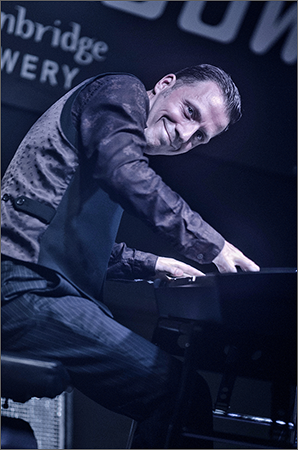
No jazz festival operates without sponsorship, which is why the opening event at Wall2Wall is the formal dinner with music at Abergavenny’s Angel Hotel to acknowledge the continuing commitment of the local firm run by Alun Griffiths, the main sponsor and one of the biggest civil engineering companies in Wales. This year, the festival’s 11th, music was provided by the quartet of vocalist and saxophonist Becki Biggins, now living nearby. It was ‘standards’ fare, moved along nicely and often inventively by young Welsh musicians Alex Goodyear (drums), Nick Kacal (bass) and Guy Shotton (keyboard). The sponsors thus knew from the start that, once more, standards of the performing kind were likely to remain high.
First, up next day was the illustrious Dale Storr with his one-man Sounds Of New Orleans show: one man playing the piano and singing. If it weren’t a cliché, Storr might be described as a national treasure of whose glister most of the nation is unaware. But that’s jazz for you. He’s a catalogue of knowledge about the Crescent City, its history, development and current state, and makes the point that early New Orleans was not just about Buddy Bolden, Louis Armstrong and marching bands but a mélange of musical influences, including classical. He packed most of them into his playing.
Although immersed in the New Orleans piano-songster tradition of Dr John (Mac Rebennack), Allen Toussaint, and Henry Byrd (Professor Longhair), he made a special plea this time for a tortured genius named James Booker, whose famous recording of Jimmy McHugh’s On The Sunny Side Of The Street was among the brightest in a parade of highlights that also included Dr John’s Dorothy and Such A Night. Now a Sheffielder, Storr reminded us that London Airport was the place where ‘Champion’ Jack Dupree was first called ‘Sir’, the respect he’d never known in his own country and which he repaid by making his home in Yorkshire. Storr’s is authentic barrelhouse pianism and singing and should be on the playlist of all broad-minded jazz lovers.
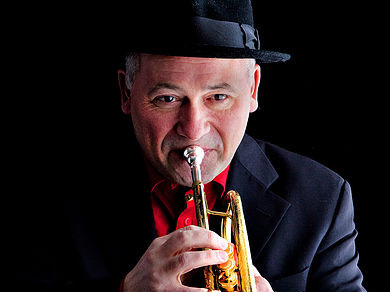
The dapper Enrico Tomasso has links with New Orleans too. As a young boy, again up to North, he was introduced to his and his father’s idol, Louis Armstrong, who gave him encouragement and tips on trumpet playing. His Wall2Wall stint, with drummer Rod Brown, bassist John Day, and pianist Colin Goode, was called Swing Till You Bop. It didn’t get to the Parker-Gillespie stage stylistically but it did cover pre-revolutionary ground, particularly when playing tunes such as Coleman Hawkins’s Bean Soup, like other post-1940 numbers written above a chord sequence for something more familiar (Tea For Two in this case) and acknowledging in the music of John Kirby, Charlie Shavers (Undecided), Ellington, and Fats Waller (Jitterbug Waltz) the stirrings of something new. Goode’s extended piano solo of Earl Hines’s Blues In Thirds was a joy, especially when taken a little quicker than Hines often played it. Among other attractions were Tomasso’s brief lecture on trumpet mutes and Brown’s hands-on drumming on That’s A Plenty.
Tomasso studied at the Leeds College of Music, the first in the country to run a fully credited jazz course. Guy Shotton graduated in music from Cardiff University’s Music department just across the road from the Royal Welsh College of Music and Drama, which continues to groom promising jazzers, among them saxophonist Daniel Newberry, whose quintet (drummer James Sherwood, pianist Shotton, bassist Ashley John Long and trumpeter/vocalist Thom Voyce) opened the doors on Saturday, the others all alumni or former alumni of the RWCM&D. That a few of these musicians have yet to fix their career directions was perhaps illustrated by Voyce’s songs – among them There Will Never Be Another You and Smoke Rings – and his doubling of flugelhorn, which he seemed reluctant to pick up and thus remained more an option. Choices will be made, in time, but there was a musician of much ambition and many talents. As a traditional quintet, Newberry’s band knows what he’s about but there was no sense in which it will necessarily be his life’s work. Its bebop credentials were indicated in Scrapple From The Apple, which, Newberry reminded us, is based on the chords of Honeysuckle Rose. Tomasso would have acknowledged that, and the Newberry quintet’s firm grasp of basics.
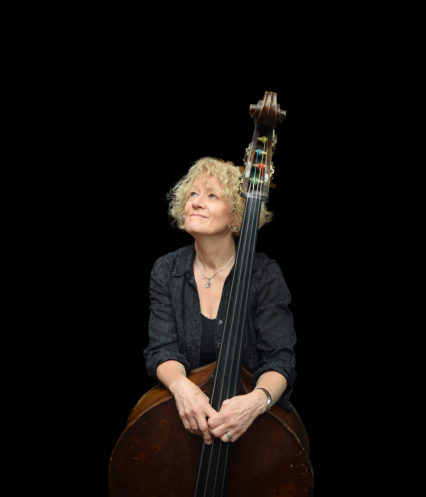
Hourly intermissions were held in the theatre bar, where jazz harpist Ben Creighton-Griffiths was first off, stoically upholding the instrument as not so much one that takes naturally to jazz but which can give jazz an ethereal twist – Erroll Garner’s Misty and Miles Davis’s So What, for example. He’s on a one-man mission, in Britain anyway, to rid the exercise of its novelty value. That he has a jazzman’s sensibility is unquestionable. The highly-regarded Swansea pianist Dave Jones set off on a marathon of hour-long interval accompaniments at the keyboard on Saturday, though he wouldn’t call them that, nor should he, considering the part he played in making good musicians sound even better in duo format. Debs Hancock’s songs – including Blue Skies, Don’t Explain, and Spring Can Really Hang You Up The Most, the last ever associated with her beloved Ella Fitzgerald – displayed a great feeling for changes of emotional temperature as one song segued into another.
In his two-hander (or four-hander) with bassist Long, Jones was extending an association already preserved on disc. Darkness had fallen by the time he joined saxophonist Glen Manby, a Welsh jazz stalwart, and the three were joined for the final chart by Newberry, who had stuck around for other festival events as only someone on a learning curve will. Good, too, to have trumpeter Ceri Williams back at the Melville in a set with Jones that reminded this reviewer of the Louis Armstrong- Earl Hines association, if in style terms coming from and going in different directions.
The first festival ‘stop press’ item was vouchsafed to this reviewer by bassist Alison Rayner, whose ARQ quintet offered a conspectus of what it’s been about since its formation: to wit, a new album likely to include a couple of tunes featured here. The quintet (Rayner, guitarist Deirdre Cartwright, pianist Steve Lodder, drummer Buster Birch, and saxophonist Diane McLoughlin) is a cohesive ensemble whose individuals not so much perform stock solos by rote but flow naturally in and out of Rayner’s sometimes quirky but always groovy compositions. Lodder, in particular, was in spectacular head-turning form. Cartwright and Rayner founded Blow The Fuse Music, and the quintet’s latest recording, A Magic Life, was raided for a few of the numbers here, including the title track; The Trunk Call, a hymn of praise to the elephant, with sounds of India simulated; and Lodder’s The OK Chorale. Rayner’s a traveller, on land and in the mind, and her compositions somehow lend themselves to live-performance enhancement without the band’s concentrated energy ever dissipating.
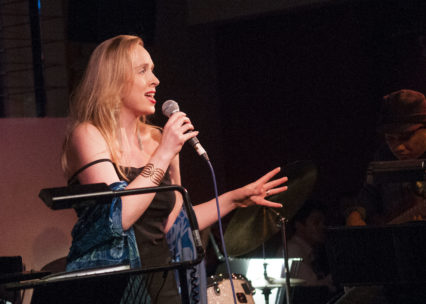
College backgrounds were to the fore when violinist Ben Holder appeared with his quartet – and wearing mysterious green hair product. He’s classically-trained (Birmingham Conservatoire) but took to jazz as many of his ilks do; in his case by listening to violinists Stephane Grappelli, Joe Venuti, and Stuff Smith, as well as Oscar Peterson and others. It explains why he also sings and plays the piano as if he can’t help it. To describe the all-action Holder as a bottle of pop might make the fizzy-drinks industry wonder if hitherto it’s been economic with the bubbles. He was all over the stage, playing the amplified violin-like Paganini stuffed with food additives. The opening Lady Be Good was so frenetic that the lady in question was given no time to protest. The rest of the band – bassist Paul Jefferies, guitarist Jez Cook, and drummer Malcolm Garrett – were accomplices in these breakneck performances, which hovered worryingly between virtuosity and high comedy. Perhaps that was the intention. The most a jazz musician can rise to on the bandstand these days is drollery; Holder goes the whole singing-dancing hog; Cab Calloway and Dizzy Gillespie would have loved him.
It might be my age but I preferred the gipsy-jazz setting, when Cook switched to a Maccaferri-style guitar to perform, with a thankfully subdued Holder, Django Reinhardt’s Minor Swing and Nuages, seguing finally into Souvenir de Villingen, a tune attributed variously to Reinhardt and Grappelli and just as variously spelt. Oh – that green hair. Holder had spotted the paste in the artists’ room and tried it. Why? Might as well ask why he fiddles so fast, as of someone who’s been told the end of the world is nigh.
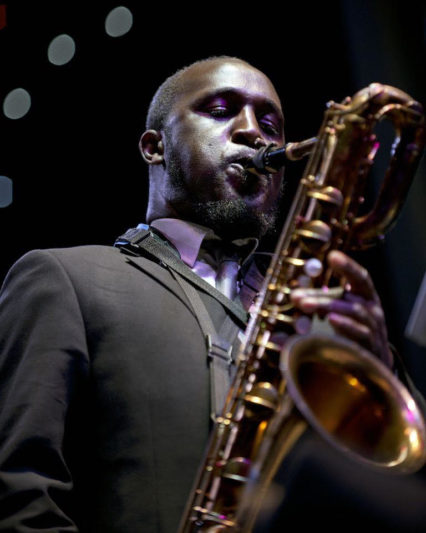
Singer Rachel Sutton is the embodiment, if one may be so bold, of glamour, not to say sexual allure. But that would be too facile a description. She, too, has South Wales antecedents, having studied at the University of Glamorgan and graduated from the RWCM&D as an actor. And that’s the key to her performances and compositions: despite the irony and the femme fatale suggestiveness, she is acting out emotions involved in the entanglements of love, and at Abergavenny she was convincing, her inter-chart banter an entertaining extra and her stage presence, if one can call it that, compelling. Supported by the cracking line-up of pianist Roland Perrin, bassist Curtis Ruiz, and drummer Paul Robinson, her delivery was often fearsome, a quality appropriate to There’ll Be Some Changes Made, I Don’t Stand a Ghost Of A Chance With You, and Love For Sale, and she turned Buddy, Can You Spare A Dime? into a heartfelt plea, reprising with Ruiz Trouble In Mind, which has ratcheted YouTube hits for an accompanying video where she’s featured in photographs out in the fields wearing a green dress. Again, it was interesting to note how singers in the elevated company are inspired to do more than they might alongside lesser musical mortals.
With the headline act up last on Saturday at the Angel Hotel, a relative juggernaut passed through the town, trailing the second item of exclusive news. Saxophonist Tony Kofi and The Organisation (guitarist Simon Fernsby, organist Pete Whittaker, and drummer Pete Cater) arrived to (virtually) play through their new album Point Blank, which had been released the previous day. The audience could buy it after the gig, but they were the first to hear the first lucky dips from it. This is a hard-bop band that doesn’t compromise on the straight-ahead direction it takes or the determination to avoid the byways. Kofi has raised the status of the baritone saxophone in this country, here playing as though he had a tenor sax in his hands. Live, the quartet appears to be sonically more than the sum of its four parts, thanks a lot to the relentless hammering of Cater’s kit, the oncoming waves of Whittaker’s organ solos, and Fernsby’s rapid guitar figurations – and, of course, the sound of Kofi, who has taught the elephant to balance elegantly on a big rubber ball, as it were, will keep wanting it to do more.
That’s not to say the music on Point Blank is constricted or narrow in scope but its presentation is formulaic. Probably to Fernsby we owe the sublime arrangement of McCoy Tyner’s Search For Peace. That said, the overall tone is one of up and off we go. Duke Pearson’s Minor League, Pepper Adams’s Bossallegro, and Wes Montgomery’s Full House were uncompromising in their refusal to be waylaid. But it depends on the listeners: at the end of this gig and the end of the album, they may not want to witness a baritone sax in full, heavy-laden flight for a few days. It’s not exactly a pretty sound and often in this kind of setting seems to be doing things against its will. But good on Kofi to persevere with it.
On the final day, attention turned from the Melville Theatre, home of the festival organisers Black Mountain Jazz, to Abergavenny Market Hall. There was free entry to the popular Jazz Alley, with music by Wonderbrass, Tarion and Rebelinx, a US band ending their UK tour in the town. On the final Sunday evening, a charity swing party in aid of Ty Hafan’s work in music therapy featured The Electric Swing Circus. Each year it’s Wall2Wall’s way of bringing the doubters into jazz and showing them that the moods captured over in the theatre can spread and occupy a bigger space. You don’t have to sit down to listen to jazz: you can dance to it as well.
The Wall2Wall Jazz Festival is an annual event, often takes place at the Angel Hotel in Abergavenny.
Nigel Jarrett is a former newspaperman, a winner of the Rhys Davies Prize for short fiction and, in 2016, the inaugural Templar Shorts award. His latest book of stories, Who Killed Emil Kreisler? was published two years ago. Jarrett writes and reviews for, inter alia, Acumen poetry magazine, Jazz Journal, and the Wales Arts Review. For many years he was a music critic of the South Wales Argus. This year Templar is publishing his story pamphlet, A Gloucester Trilogy.
Header photo: Tony Kofi


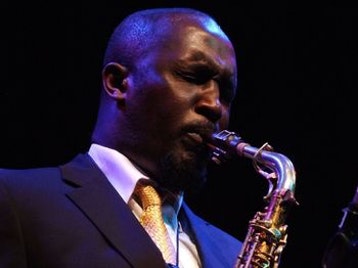
 Enjoyed this article? Support our writers directly by buying them a coffee and clicking this link.
Enjoyed this article? Support our writers directly by buying them a coffee and clicking this link.







